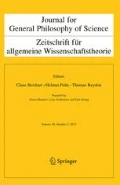Abstract
This paper is a reaction to ‘Styles of Thought on the Continental Drift Debate’ by Pablo Pellegrini, published in this journal. The author argues that rationalist accounts of the continental drift debate fail because they overlook important issues. In this discussion we distinguish various forms of rationalism. Then we present a sophisticated rationalist account of the continental drift debate and argue that it is satisfactory because it explains all the central developments in that debate. Finally, we point to a problematic tension in Pellegrini’s paper and unravel an underlying ambiguity.
Notes
While Pellegrini seems to be aware of this, his discussion may give an impression that Wegener’s original theory was accepted in the 1960s.
As we argue in our previous paper (Šešelja & Weber 2012), Wegener’s account was—in spite of these objections, which posed a problem for its acceptance—still worthy of pursuit at the time.
It is worth mentioning that already at the end of the 1920s Arthur Holmes suggested a model of ‘seafloor thinning’ which was relatively similar to Hess’s. While Holmes’s model made the theory worthy of pursuit, it was again tentative in nature and insufficiently supported by evidence to warrant its acceptance (see Šešelja and Weber 2012, 155).
Note that the presence of biased attitudes within a given scientific community is not as such in conflict with rationalist explanations of the given scientific episode: major developments of such episodes may still be explained in terms of research-related reasons.
For instance, our account is compatible with those that put emphasis on the role of non-epistemic values, such as Hugh Lacey’s (2015). In Lacey’s terminology we could say that Wegener’s theory was not worthy of endorsement (i.e. acceptance in the context of application, where non-epistemic consequences of error have to be taken into consideration), nor was it worthy of holding (i.e. acceptance in the sense of incorporation into the established scientific knowledge), though it was worthy of adopting in the sense of framing further research in view of the given hypothesis.
References
Barnes, B., & Bloor, D. (1982). Relativism, Rationalism and the Sociology of Knowledge. In M. Hollis & S. Lukes (Eds.), Rationality and Relativism (pp. 21–47). Cambridge: MIT Press.
Hacking, I. (1999). The Social Construction of What?. Cambridge, MA: Harvard University Press.
Hess, H. (1960), Evolution of Ocean Basins. Report to Office of Naval Research. Contract No. 1858(10).
Hess, H. (1962). History of Ocean Basins. In A. Engel, H. James, & B. Leonard (Eds.), Petrologic Studies: A Honor of A. F. Buddington (pp. 599–620). New York: Geological Society of America.
Lacey, H. (2015). ‘Holding’ and ‘endorsing claims in the course of scientific activities’. Studies in History and Philosophy of Science A, 53, 89–95.
Laudan, L. (1977). Progress and its Problems. London: Routledge and Kegan Paul.
Le Grand, H. (1988). Drifting Continents and Shifting Theories. Cambridge: Cambridge University Press.
Nelson, A. (1994). How could scientific facts be socially constructed? Studies in History and Philosophy of Science A, 25, 535–547.
Oreskes, N. (1999). The Rejection of Continental Drift: Theory and Method in American Earth Science. Oxford: Oxford University Press.
Pellegrini, P. (2019). Styles of thought on the continental drift debate. Journal for General Philosophy of Science, 50, 85–102.
Šešelja, D., & Weber, E. (2012). Rationality and irrationality in the history of continental drift. Studies in History and Philosophy of Science, 43, 147–159.
Wegener, A. (1912). Die Entstehung der Kontinente. Geologische Rundschau, 3, 276–292.
Wegener, A. (1915). Die Entstehung der Kontinente und Ozeane. Brunswick: Friederich Vieweg and Sohn.
Acknowledgements
The authors thank the reviewer for valuable feedback and Jonathan Regier for checking the final manuscript.
Author information
Authors and Affiliations
Corresponding author
Additional information
Publisher's Note
Springer Nature remains neutral with regard to jurisdictional claims in published maps and institutional affiliations.
Rights and permissions
About this article
Cite this article
Weber, E., Šešelja, D. In Defence of Rationalist Accounts of the Continental Drift Debate: A Response to Pellegrini. J Gen Philos Sci 51, 481–490 (2020). https://doi.org/10.1007/s10838-020-09516-4
Published:
Issue Date:
DOI: https://doi.org/10.1007/s10838-020-09516-4

